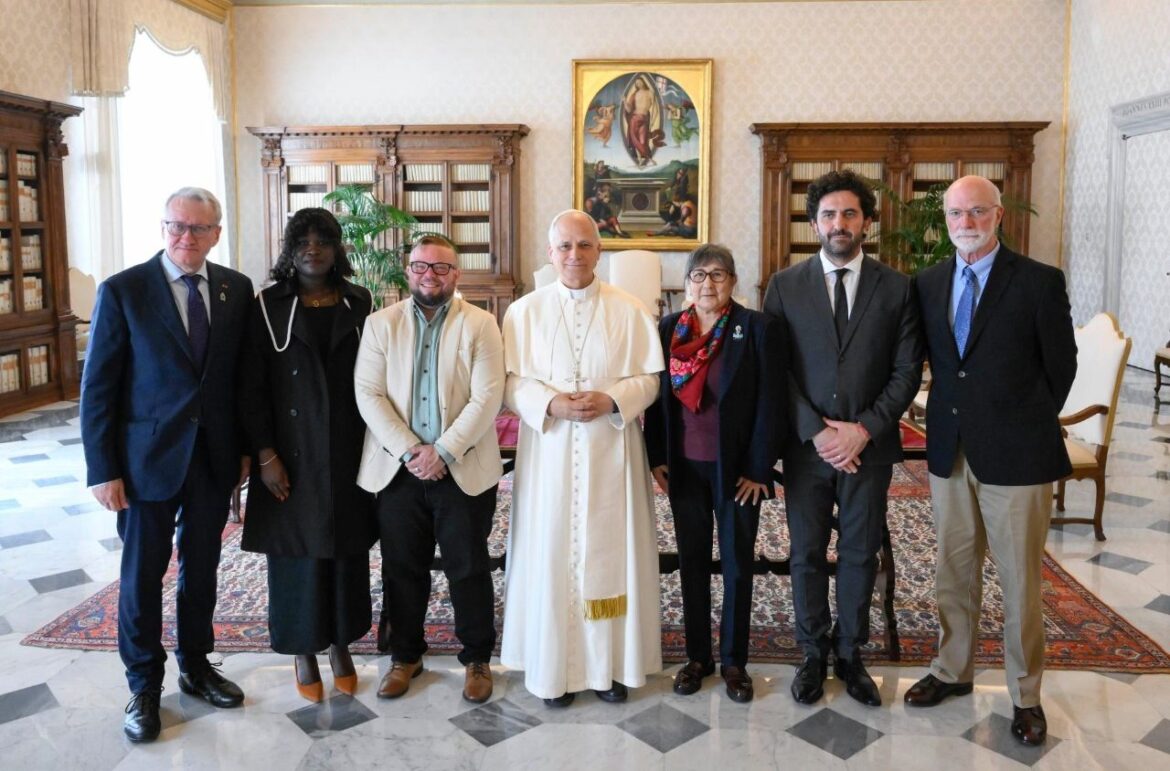Pope Leo receives six members of ECA Global, an international human rights association that works for greater support and compensation for victims of abuse and calls for stronger commitment and cooperation from the Catholic Church. Participants describe the audience as “a historic and hope-filled step toward greater cooperation.”
By Salvatore Cernuzio
What began as a letter became a meeting today in the Apostolic Palace. It was the first time since his election that Pope Leo XIV met with a group of abuse survivors and activists engaged in fighting what recent Popes have called a “scourge.”
On Monday morning, the Pope received six members of the ECA Global (Ending Clergy Abuse) board of directors. The human rights association counts members from more than 30 countries on six continents, including activists and survivors of sexual abuse by representatives of the Catholic Church. Since its founding in 2018, the network—particularly active in the United States—has sought to ensure that the Catholic Church follows the 2014 United Nations recommendations for an effective “zero tolerance” policy.
According to ECA members, today’s audience with Pope Leo “certainly marks a historic and hope-filled step toward greater cooperation.”
These words were included in a statement released by the organization and later shared with the press during a press conference. The six participants were Gemma Hickey (Canada), Timothy Law (USA), Evelyn Korkmaz (Canada, First Nation), Matthias Katsch (Germany), Janet Aguti (Uganda), and Sergio Salinas (Argentina). They come from different backgrounds and cultures, united by the same goal: to ensure that abuse never happens again and to promote more effective collaboration with the Church.
Welcome and listening
All six ECA members expressed satisfaction with their meeting with Pope Leo XIV—his attitude, his approach, and his ability to listen. Gemma Hickey, a survivor of abuse in Newfoundland and Labrador, Canada, by a priest who was later removed and reassigned to two parishes, said:
“Pope Leo was very open, and each of us shared some personal reflections. He was warm and listened to us. He also has a good sense of humor—very humble.”
At the start of the audience, the group read a joint statement “to begin with open minds,” and presented their “Zero Tolerance Initiative,” emphasizing “the importance of consistent global standards and victim-centered policies.”
The meeting also included discussion of the work of the Pontifical Commission for the Protection of Minors, which last week presented its second Annual Report. The Pope suggested establishing a “dialogue” between the two bodies.
“It was a deeply meaningful conversation, reflecting a shared commitment to justice, healing, and genuine change,” Hickey said again. “Survivors have long sought a place at the table, and today we felt heard.”
Dialogue and respect
As mentioned, the encounter originated from a letter that ECA had sent to the newly elected Pope. Inspired by the words of Robert Francis Prevost from the Loggia of Blessings, the members introduced themselves as “bridge builders, ready to walk together toward truth, justice, and healing.”
“In these polarized times,” they wrote, “the most radical act we can do is to sit down and talk.” The Pope responded “positively” and, with “a gesture of openness,” welcomed the opportunity for “a direct and respectful dialogue on the path forward.”
This led to the private meeting in the Apostolic Palace, which lasted about an hour and was filled with testimonies and proposals. “We came not only to express our concerns but also to explore how we can work together to ensure the protection of children and vulnerable adults around the world,” said Janet Aguti of Uganda, vice-chair of ECA’s board.
There was, Gemma Hickey added, “no anger—only hope for accountability and lasting change.” She continued: “We believe in the intrinsic dignity of every child and vulnerable adult, in the courage of every survivor, and in the Church’s moral responsibility to lead with transparency and compassion. Our mission is to support those who have been harmed and to promote reforms that protect the most vulnerable, helping to restore trust and integrity in an institution we know is capable of great good.”
Willingness to work together
“The goal,” added Tim Law, co-founder and board member of ECA USA, “is not confrontation, but accountability, transparency, and the willingness to work together to find solutions.”
For many, this marks significant progress after years of encountering barriers when seeking help. “As a survivor of a residential school, I carry the weight of intergenerational trauma caused by institutions that were meant to protect us,” said Canadian survivor Evelyn Korkmaz. “Today’s meeting is another step toward truth and reconciliation.”
From Germany, Matthias Katsch explained that the group asked the Pope to offer “hope,” understood as “justice,” “compensation,” and “better safeguards for children and vulnerable adults.” He added: “It is no longer enough for survivors to speak; society must listen.” It is not only the Church, he said, but society as a whole that must be willing to listen and learn from survivors’ testimonies.
Also taking part in the press conference was Francesco Zanardi, a member of ECA and of the association Rete L’Abuso, who announced a forthcoming report on cases of clerical abuse and pedophilia in Italy.
The organization concluded the meeting by “underlining the urgent need for continued dialogue, compassion, and collaboration to build a future in which safety, accountability, and dignity are not only protected but where survivors’ voices serve as a model for all.”


